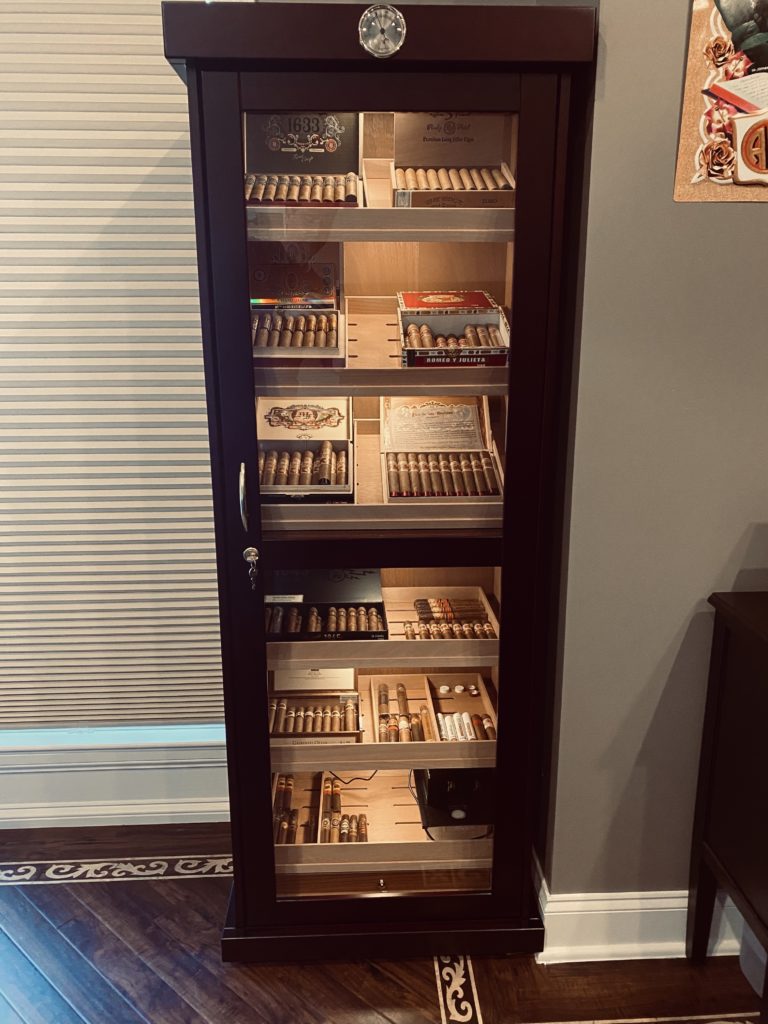Introduction: Why Proper Cigar Storage Matters
For cigar enthusiasts, every cigar represents more than just rolled tobacco—it’s craftsmanship, culture, and an experience to be savored. But even the finest hand-rolled cigar can lose its flavor and character if it isn’t stored correctly. That’s why learning how to store cigars is one of the most important steps for any aficionado or beginner. Proper storage preserves freshness, prevents damage, and ensures that every puff delivers the taste and aroma that cigar makers intended.
This guide dives deep into the best methods, tools, and tips to store your cigars, whether you own a growing collection or just a handful for special occasions.
The Ideal Cigar Storage Environment
Cigars are delicate products that respond to changes in their environment. Two primary factors determine whether your cigars stay in perfect condition: humidity and temperature.
Humidity: Cigars thrive at around 65–72% relative humidity. Too little moisture and cigars dry out, becoming brittle and harsh. Too much moisture and mold can form, ruining your collection.
Temperature: The sweet spot is 65–70°F (18–21°C). Higher temperatures increase the risk of tobacco beetles hatching, while colder environments dry cigars out too quickly.
The balance of these two factors is often called the 70/70 rule—70% humidity at 70°F. While not a hard rule, it’s a useful baseline when learning how to store cigars properly.

Option 1: Storing Cigars in a Humidor
The gold standard for anyone serious about cigars is a humidor. These storage boxes are designed to regulate humidity and temperature, ensuring cigars stay fresh for months—or even years.
Types of Humidors
Desktop Humidors – Stylish wooden boxes that hold 25–100 cigars. Ideal for home or office use.
Cabinet Humidors – Large furniture-style units that can hold hundreds or even thousands of cigars. Perfect for collectors.
Travel Humidors – Compact, durable cases designed to protect cigars on the go.
Electronic Humidors – High-tech options with built-in digital humidification systems for precision control.
How to Set Up a Humidor
Season the Humidor: Before adding cigars, wipe down the Spanish cedar interior with a damp cloth and place a small bowl of distilled water inside for 24–48 hours. This prevents the wood from drawing moisture out of your cigars.
Add Humidification Devices: Options include humidity beads, gel jars, or electronic systems.
Monitor Conditions: Always keep a hygrometer inside to measure humidity and temperature. Digital hygrometers tend to be more accurate than analog versions.
Knowing how to store cigars in a humidor ensures they age gracefully, improving their complexity and balance over time.
Option 2: Cigar Storage Without a Humidor
Not everyone wants—or needs—to invest in a traditional humidor right away. Luckily, there are budget-friendly methods that still work well.
The Tupperdor
A Tupperdor is a simple airtight plastic container (like Tupperware) used with humidity packs such as Boveda. They’re inexpensive and highly effective for beginners.
The Coolerador
For larger collections, a plastic cooler can become a “Coolerador.” Lined with cedar trays and paired with humidity packs, it’s essentially a DIY humidor capable of holding hundreds of cigars at a fraction of the price.
Ziploc Bag with Humidity Pack
If you just bought a few cigars and need short-term storage, a Ziploc bag with a humidity pack works surprisingly well. Just make sure it’s kept out of direct sunlight and away from heat sources.
These alternatives provide practical solutions for anyone still learning how to store cigars before committing to a high-end humidor.
Traveling with Cigars: On the Go Storage Tips
Vacations, business trips, and golf outings often call for cigars. But travel introduces risks: changes in pressure, temperature, and humidity.
Best Practices
Use a travel humidor or durable cigar case.
Pack with a small humidity pack to maintain freshness.
Avoid storing cigars in luggage without protection—they can crack or dry out.
By following these steps, you’ll never have to worry about how to store cigars while traveling.
Mistakes to Avoid in Cigar Storage
Many enthusiasts ruin their cigars without realizing it. Here are the most common pitfalls:
Using Tap Water in Humidifiers: Minerals and chemicals in tap water promote mold growth. Always use distilled water.
Over-Humidifying: High humidity leads to swelling, cracked wrappers, and even mold.
Inconsistent Temperatures: Placing humidors near windows, vents, or radiators causes fluctuations that damage cigars.
Neglecting Regular Checks: Cigars require monitoring—don’t just “set and forget.”
Avoiding these mistakes is crucial when mastering how to store cigars – Check out Cigars shapes and Sizes effectively.



Aging Cigars: Turning Storage into an Art
Some cigars get better with time, just like fine wine. Aging cigars in a well-maintained humidor allows the flavors to meld, producing smoother and richer smoke.
Keys to Successful Aging
Store cigars for 1–5 years for noticeable improvements.
Maintain stable humidity around 65% for aging, slightly lower than everyday storage.
Keep different blends separate—full-bodied cigars can overpower milder ones if stored together.
Learning how to store cigars with aging in mind transforms storage from a necessity into a rewarding hobby.
How Long Do Cigars Last in Storage?
When stored correctly, cigars can last for years, even decades. Some enthusiasts collect rare cigars and store them for 20+ years before enjoying them.
Without proper storage: Cigars dry out in a matter of days or weeks.
In makeshift storage: Cigars can last several months.
In a quality humidor: Cigars can last indefinitely, with many improving over time.
This is why investing time in learning how to store cigars is essential for anyone who values the hobby.
Advanced Tools and Accessories for Cigar Storage
Beyond humidors, several accessories enhance cigar storage and care:
Digital Hygrometers – More accurate than analog versions.
Cedar Dividers and Trays – Help organize cigars and prevent flavor transfer.
Cigar Humidity Packs – Simple, maintenance-free humidity control.
Cigar Tubes – Protect individual cigars from damage and drying out.
Each of these tools helps refine your approach to how to store cigars at different scales and budgets. Check out accessories at Amazon here.
Frequently Asked Questions
1. Can I store cigars in the refrigerator?
No. Refrigerators are too cold and dry, stripping cigars of their oils and flavors.
2. How often should I check my humidor?
Once a week is a good rule of thumb. Adjust humidity packs or refill humidifiers as needed.
3. Do cigars need to “breathe”?
Yes. Occasionally rotating cigars inside your humidor allows for even humidity distribution.
4. What happens if my cigars dry out?
Dry cigars can sometimes be rehydrated slowly using humidity packs, but they’ll never fully regain their original quality.
Conclusion: Perfecting the Art of Storing Cigars
Cigars are more than tobacco—they’re tradition, craftsmanship, and luxury rolled into one. Whether you own a handful or a thousand, proper storage determines whether they provide the smoking experience you expect.
By controlling humidity and temperature, using tools like humidors or Tupperdors, and avoiding common mistakes, you’ll always know how to store cigars the right way. With patience, consistency, and the right equipment, your collection will remain fresh, flavorful, and ready whenever you want to light up.


